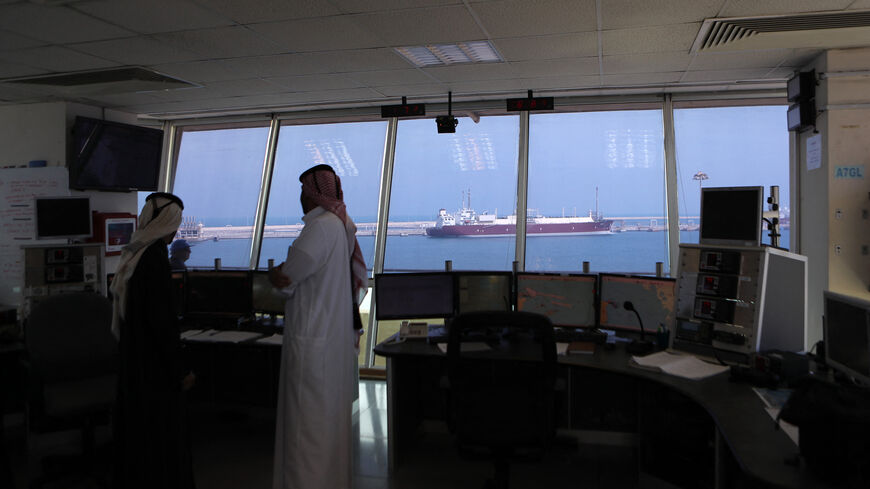DUBAI — Qatar’s plan to sign a record volume of long-term liquified natural gas (LNG) contracts announced by the country’s Energy Minister Saad al-Kaabi Tuesday is paving the way to the Gulf state’s goal to lead the global LNG market, and it's looking toward Asian countries to accomplish it.
Doha News reported that al-Kaabi and the CEO of state-owned QatarEnergy, said at the LNG 2023 conference in Vancouver, “Forty percent of all the new LNG that will come to the market by 2029, when all our projects are up and running, is going to be from QatarEnergy."
Qatar is already one of the world’s leading LNG exporters, if not the top, depending on the calculations. The Gulf state tied with the United States as the world’s top LNG exporter last year with 81.2 million tons according to ship-tracking data collected by Bloomberg. Financial market data provider Refinitiv reported that Australia took the lead in LNG exports for 2022 with 10.7 billion cubic feet per day, followed by the United States with 10.6 and Qatar close in third with 10.5.
Qatar took steps last year to maintain its lead and increase future output with the approval of expansion projects set to raise its LNG output by 64% to 126 million tons per year by 2027, reported Reuters.
Joseph Webster, a senior fellow at the Atlantic Council Global Energy Center, said Qatar's appeal is growing to countries in Asia, particularly with the impact of the Russian war on Ukraine.
"There’s high reliability. There are not the same geopolitical risks as there are with the United States, Canada and also Australia from Qatar,” Webster told Al-Monitor. He adds that Qatar, which exports 70% of its energy to Asian countries according to S&P global, has more favorable transportation economics and agreements, in addition to some of the lowest LNG prices globally.
As a result of the Russia-Ukraine war that began in February of last year, he said the United States has shifted its supplies to Europe, leaving an opening for Qatar. Russian piped gas exports to European members of the Organization for Economic Co-Operation and Development (OECD) decreased by 70% during the 2022 to 2023 heating season from October through March, according to the Gas Market Report Q2-2023 by the International Energy Agency. During that period, the United States increased its LNG outflow to OECD Europe by 30%, accounting for 40% of the region's total LNG imports.
Qatar is ramping up its activity and actively seeking to fill this void with vast amounts needed to replace piped gas from Russia and redirected US supplies. The Gulf state is offering shorter and cheaper LNG contracts in attempts to entice new customers for supply from expansion projects according to Bloomberg, citing sources connected to QatarEnergy’s 15-year supply deal signed last month with Bangladesh’s state-owned PetroBangla for 1.8 million tons starting in 2026.
Webster said that China, which is engaged in a trade war with the United States, is increasingly viewing Qatar as a dependable LNG supplier, demonstrated by its 27-year agreement signed with QatarEnergy in June for four million tons of LNG per year. This sentiment is shared by other Asian nations as well, he added.
“Since the Russian invasion of Ukraine, not just Beijing but also other capitals around the world are also concerned about energy security and looking towards Qatar,” said the energy analyst, naming efficiency as an added motivator.
"Once you wrap in the delivery costs, which include transportation as well as production costs, Qatari gas tends to be much more competitive,” he added.
Japan, which remains highly dependent on imported oil and LNG, is looking to strengthen its weak energy resources with a diplomatic visit by the country’s Prime Minister Fumio Kishida to Qatar later this month, amid his regional tour.
Japanese LNG importers are currently in talks for new supply contracts with Qatar, according to Bloomberg, which reported that buyers haven’t signed a contract with the Middle East country since 2014. Japan’s LNG trade with Qatar started to decline in 2021, when its 2014 contract came to an end, and Qatar’s deliveries dropped by more than 60% in 2022, according to data collected by the news agency. Given current global energy security concerns, willingness for an agreement seems rekindled.
Webster noted that looking forward, Qatar’s rapid expansion of LNG deals and infrastructure is a sign that the gas-rich nation sees continued future returns from the energy source despite the current movement for energy transition away from traditional sources.
“[The Qataris] genuinely do believe that natural gas will continue to be a bridge fuel for a decarbonized future. Second, there’s first-mover advantages,” he told Al-Monitor. By committing to these huge volumes of exports, Qatar is essentially deterring other new entrants from joining the LNG market and further securing its control, he added.


f0eb.jpg)





